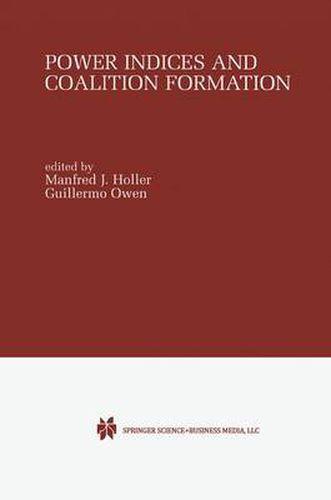Readings Newsletter
Become a Readings Member to make your shopping experience even easier.
Sign in or sign up for free!
You’re not far away from qualifying for FREE standard shipping within Australia
You’ve qualified for FREE standard shipping within Australia
The cart is loading…






This title is printed to order. This book may have been self-published. If so, we cannot guarantee the quality of the content. In the main most books will have gone through the editing process however some may not. We therefore suggest that you be aware of this before ordering this book. If in doubt check either the author or publisher’s details as we are unable to accept any returns unless they are faulty. Please contact us if you have any questions.
In recent years, publications on power indices and coalition formation have multiplied. Obviously, the application of these concepts to political institutions, more specifically, to the analysis of the European Union and, as it seems, the election of the President of the United States is getting more and more popular. There are, however, also new theoretical instruments and perspectives that support these applications: First of all, the probabilistic model of coalition formation has to be mentioned which is made operational by the multilinear extension of the characteristic function form of coalition games. This instrument triggered off a reinterpretation of existing power indices and the formulation of new indices. This development is accompanied by an intensive discussion of the concept of power in general - what do we measure when we apply power measures? - and the properties that an adequate measure of power has to satisfy. Various concepts of monotonicity were proposed as litmus test. The discussion shows that the underlying theories of coalition formation play a decisive role. New results will be discussed in this volume. Its contributions put flesh and blood on the theoretical innovations and their applications that led to a growing interest in power indices and coalition formation.
$9.00 standard shipping within Australia
FREE standard shipping within Australia for orders over $100.00
Express & International shipping calculated at checkout
This title is printed to order. This book may have been self-published. If so, we cannot guarantee the quality of the content. In the main most books will have gone through the editing process however some may not. We therefore suggest that you be aware of this before ordering this book. If in doubt check either the author or publisher’s details as we are unable to accept any returns unless they are faulty. Please contact us if you have any questions.
In recent years, publications on power indices and coalition formation have multiplied. Obviously, the application of these concepts to political institutions, more specifically, to the analysis of the European Union and, as it seems, the election of the President of the United States is getting more and more popular. There are, however, also new theoretical instruments and perspectives that support these applications: First of all, the probabilistic model of coalition formation has to be mentioned which is made operational by the multilinear extension of the characteristic function form of coalition games. This instrument triggered off a reinterpretation of existing power indices and the formulation of new indices. This development is accompanied by an intensive discussion of the concept of power in general - what do we measure when we apply power measures? - and the properties that an adequate measure of power has to satisfy. Various concepts of monotonicity were proposed as litmus test. The discussion shows that the underlying theories of coalition formation play a decisive role. New results will be discussed in this volume. Its contributions put flesh and blood on the theoretical innovations and their applications that led to a growing interest in power indices and coalition formation.